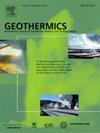Study on the ground temperature response induced by GSHP system operation under different geological conditions
IF 3.5
2区 工程技术
Q3 ENERGY & FUELS
引用次数: 0
Abstract
Ground temperature is a crucial factor influencing the performance of the ground source heat pump (GSHP) system. Different from the periodic variation of the initial shallow-layer ground temperature, the deep-layer ground temperature variation becomes much more complex after the system starts operating. At this stage, not only the ground surface heat exchange conditions and the geothermal gradient are influencing factors, but also the heat exchange process of the buried pipe and geological conditions will affect the ground temperature variation. In this study, ground temperature data of two systems located in different geological conditions are taken as examples. Based on the monitored data, the relationship between the ground temperature variation and depth is analyzed, as well as the impact from geological distributions. It has been found that the variation amplitude of the ground temperature varies along the depth direction. However, it is hard to find clear laws of the ground temperature variations from the measured data. Therefore, CFD (Computational Fluid Dynamics) simulation work is conducted to verify some guesses from the monitoring data analysis. It has been found that, except for the pipe bottom, the difference in ground temperature response mainly results from the change in ground thermal properties, not the heat transfer depth position of the buried pipes. This finding is beneficial to understanding the ground temperature variation mechanism in the GSHP system operation.
不同地质条件下地源热泵系统运行引起的地温响应研究
地温是影响地源热泵系统性能的重要因素。与初始浅层地温的周期性变化不同,系统开始运行后深层地温的变化变得复杂得多。在这一阶段,除了地表换热条件和地温梯度是影响因素外,地埋管的换热过程和地质条件也会影响地温变化。本研究以位于不同地质条件下的两个系统的地温数据为例。根据实测资料,分析了地温变化与深度的关系,以及地质分布对地温变化的影响。研究发现,地温的变化幅度沿深度方向变化。然而,从实测资料中很难找到地温变化的明确规律。因此,通过CFD (Computational Fluid Dynamics)模拟工作来验证监测数据分析的一些猜测。研究发现,除管道底部外,地温响应的差异主要来自于地面热物性的变化,而不是埋地管道的换热深度位置。这一发现有助于理解地源热泵系统运行过程中地温变化的机理。
本文章由计算机程序翻译,如有差异,请以英文原文为准。
求助全文
约1分钟内获得全文
求助全文
来源期刊

Geothermics
工程技术-地球科学综合
CiteScore
7.70
自引率
15.40%
发文量
237
审稿时长
4.5 months
期刊介绍:
Geothermics is an international journal devoted to the research and development of geothermal energy. The International Board of Editors of Geothermics, which comprises specialists in the various aspects of geothermal resources, exploration and development, guarantees the balanced, comprehensive view of scientific and technological developments in this promising energy field.
It promulgates the state of the art and science of geothermal energy, its exploration and exploitation through a regular exchange of information from all parts of the world. The journal publishes articles dealing with the theory, exploration techniques and all aspects of the utilization of geothermal resources. Geothermics serves as the scientific house, or exchange medium, through which the growing community of geothermal specialists can provide and receive information.
 求助内容:
求助内容: 应助结果提醒方式:
应助结果提醒方式:


